Baseball Old
Baseball – Click on Inductee to view Biography
1980
- Earl Averill, Jr. - Baseball
-
1980
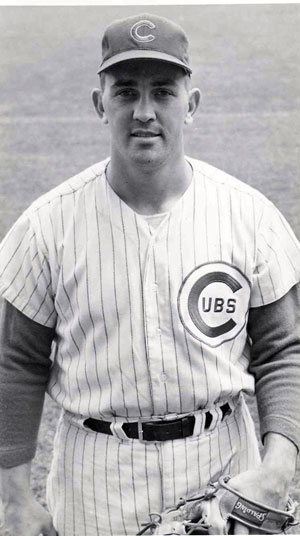 As a baseball player, Earl Averill, Jr., had plenty of expectations to live up to and he did in three years at the University of Oregon and seven seasons in the Major Leagues.
As a baseball player, Earl Averill, Jr., had plenty of expectations to live up to and he did in three years at the University of Oregon and seven seasons in the Major Leagues.The son of Hall of Famer Earl Averill (inducted in 1975), Earl Jr., hit .439 as a sophomore at the University of Oregon and was a three-time selection on the Pacific Coast Conference’s All-North Division team at third base or outfield from 1951-53. Selected by the Cleveland Indians in the 1952 amateur draft, Earl Jr., reached the big leagues in 1956 and played for the Indians, Chicago Cubs, Chicago White Sox, Los Angeles Angels and Philadelphia Phillies, as a catcher or third baseman through 1963. In 1961, he hit 21 home runs and drove in 59 runs as the catcher for the expansion Angels. Earl Jr., finished his major league career with 249 hits, 44 home runs, 159 RBIs and a .242 average.
He also played on minor league teams for all or parts of nine seasons, including the entire 1957 season on Cleveland’s Triple-A affiliate in San Diego. In addition to San Diego, he played at the Triple-A level for teams in Indianapolis, Louisville, Ky., Seattle and Toronto. He retired in 1965 at the age of 35 with 747 hits, 104 home runs and a .293 average in his minor league career.
He was inducted to the Oregon Sports Hall of Fame as part of the charter class in 1980.
- Carson "Skeet" Bigbee - Baseball
-
1980
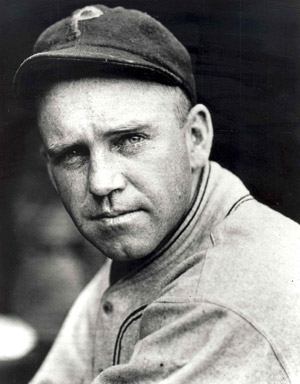 Carson Bigbee, born in 1895, grew up in Lebanon and played baseball at the University of Oregon before beginning a standout career in the Major Leagues.
Carson Bigbee, born in 1895, grew up in Lebanon and played baseball at the University of Oregon before beginning a standout career in the Major Leagues.Bigbee played part of just one season for the Ducks, 1915, before turning professional. He reached the Pittsburgh Pirates in 1916 at age 21, and played 11 seasons with the team. He played four games and had one hit in the 1925 World Series, which the Pirates won in seven games over the Washington Senators.
In his 11 seasons, he hit .300 or better twice, including .350 in 1922, and finished with 1,205 hits, 17 home runs, 324 RBIs and a .287 career average in 1,147 games.
Bigbee stole 182 bases, which earned him the nickname “Skeeter.”
Following his career with the Pirates, Bigbee played two more seasons in the Pacific Coast League for the Portland Beavers, Seattle Indians and Los Angeles Angels before retiring in 1928 at age 33.
He managed the Muskegon, Wis., Lassies of the All-American Girls Professional Baseball League to a record of 46-66 in 1949.
His older brother Lyle, who played at Oregon from 1913-15, also reached the Major Leagues as a pitcher for parts of two seasons, 1920-21. The two played together for a short time in 1921.
Carson Bigbee died in 1964 in Portland at age 69. He was inducted into the Oregon Sports Hall of Fame as part of the inaugural class in 1980.
- Joe Gordon - Baseball
-
1980
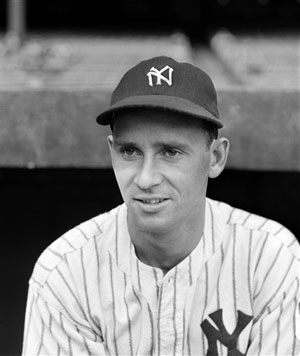 Joe Gordon, who grew up at Portland's Jefferson High and had a standout baseball career at the University of Oregon, and a Hall of Fame career during 11 seasons as a second baseman with New York and Cleveland of the American League.
Joe Gordon, who grew up at Portland's Jefferson High and had a standout baseball career at the University of Oregon, and a Hall of Fame career during 11 seasons as a second baseman with New York and Cleveland of the American League.Gordon played baseball, football, ran track and even competed in gymnastics at Oregon.
He led the 1934 and '35 teams to the Pacific Coast Conference Northern Division baseball titles. He frequently performed as a gymnast during halftime of basketball games at McArthur Court.
After two solid seasons in the minors, Gordon moved to New York in 1938 at age 23 and played seven season for the Yankees and four for the Cleveland Indians, a stretch interrupted in '44 and '45 due to military service.
In his 11 seasons, he was selected to the American League All-Star team nine times and won the MVP in 1942 after hitting .322 with 173 hits, 18 homers and 103 RBIs. The Yankees traded him to Cleveland in 1947. In his 11 seasons, Gordon had 1,530 hits, 253 homers, 975 RBIs and a combined .268 batting average. He played for five World Series champions, winning in 1938, '39, '41 and '43 for the Yankees and in 1948 with Cleveland.
Gordon earned the nickname "Flash" because of his speed and after the comic book character.
Following his release from Cleveland in 1950, Gordon played two seasons for Sacramento of the Pacific Coast League and retired at age 37. He played one more game in the minors: with San Francisco in 1957 at age 42; getting two hits in three at-bats and even pitching an inning.
He managed the Indians, Detroit Tigers, Kansas City A's and Kansas City Royals, compiling a 305-308 record in five seasons. In 1960, his third season as manager in Cleveland, the Indians traded him to the Detroit Tigers. He compiled a record of 65-77 during that season.
Gordon was voted to the Baseball Hall of Fame in 2007 by the Veterans Committee, which included Bobby Doerr, a long-time opponent with Boston and fishing buddy in the offseason. He was voted to the Oregon Sports Hall of Fame as part of the inaugural class in 1980.
- Larry Jansen - Baseball
-
1980
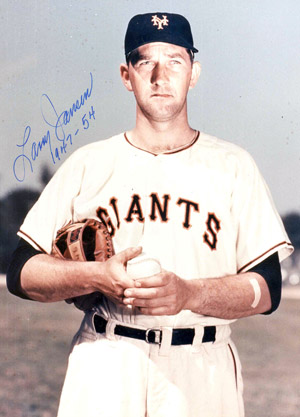 Born in Verboort in 1920, Larry Jansen made his mark as a baseball player at both the major and minor league levels, including three seasons with the Portland Beavers.
Born in Verboort in 1920, Larry Jansen made his mark as a baseball player at both the major and minor league levels, including three seasons with the Portland Beavers.Jansen graduated from Verboort High in 1938 and entered pro baseball with the Salt Lake City Bees in 1940. He played four seasons – two each before and after World War II, with the San Francisco Seals before the New York Giants, noting Jansen’s 30 wins in 1946, offered him a spot in their starting rotation in 1947. Jansen, at age 26, went 21-5 in his rookie season and finished second to Jackie Robinson as Rookie of the Year. He won no fewer than 11 games the next six seasons.
In 1951, Jansen went 23-11 and helped the Giants to the World Series, where they lost to the cross-town Yankees. Jansen started two games in the Series. He also pitched for the Series champion Giants in 1954, but did not see action in the Series.
He pitched for the Seattle Rainiers in 1955 and earned time with the Cincinnati Reds for part of the 1956 season. In nine seasons in the National League, Jansen went 122-89, recorded 10 saves and had an ERA of 3.58. He was an All-Star in 1950 and ’51 and earned votes as league MVP four times.
Jansen played three seasons: 1958-69, with the Beavers before retiring at age 39. He managed both Portland and Seattle, but made his biggest impact as pitching coach with the San Francisco Giants for 11 seasons, starting in 1961.
Jansen, who fathered 10 children with wife Ellen, died in 2009. He was inducted to the Oregon Sports Hall of Fame as part of the charter class in 1980.
- Johnny Pesky - Baseball
-
1980
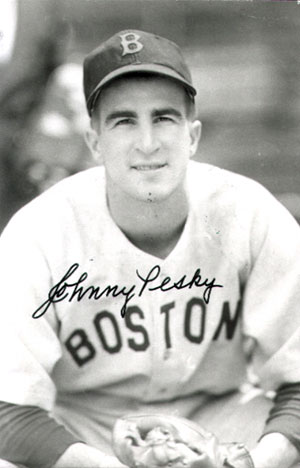 Johnny Pesky played his way from downtown Portland into the hearts of Boston Red Sox fans around the world as a scrappy infielder, loyal coach and colorful commentator whose name will forever be part of Fenway Park.
Johnny Pesky played his way from downtown Portland into the hearts of Boston Red Sox fans around the world as a scrappy infielder, loyal coach and colorful commentator whose name will forever be part of Fenway Park.Born in Portland in 1919, Pesky grew up just blocks from Vaughn Street Park, home of the Portland Beavers of the Pacific Coast League, and spent some time as a clubhouse attendant in the visitors’ locker room. He played middle infield for Lincoln High, and upon graduating in 1937 played on semipro teams in Bend and Silverton before being signed by the Red Sox in 1940.
Pesky needed just two seasons in the minors to reach the Red Sox as shortstop, having impressed the team by being named American Association Most Valuable Player while with Louisville in 1941. As a rookie, he hit .331, led the American League with 205 hits and finished third in voting for MVP.
After serving three years in the Navy during World War II, Pesky returned to Boston as shortstop in 1946 and hit .335, led the AL in hits again with 208 and finished fourth in voting for MVP. With Pesky batting ahead of Ted Williams, the Red Sox reached the World Series in ’46, but lost to St. Louis in seven games.
Pesky played parts of six more seasons with Boston before being traded to Detroit in 1952. Detroit traded him to Washington in 1954, where he finished his major league career.
In 10 seasons, Pesky hit .307, had 1,455 hits and 404 runs batted in. The foul pole in right field of Fenway Park is nicknamed “Pesky’s Pole,” the name having been created by broadcaster Mel Parnell in honor of Pesky’s lack of power – the pole being just 302 feet from home plate.
Upon retiring, Pesky turned to coaching, first in the New York Yankees organization and then with Detroit. In 1960, the Red Sox named him manager for their Seattle affiliate in the PCL and he moved up to manage the big league club after two seasons. After two poor seasons, he was released as manager. Pesky coached with the Pittsburgh Pirates for several years, but soon returned to Boston and remained there as a broadcaster, an official and unofficial salesman and again as a bench coach. He managed the Sox for the final five games of the 1980 season, finishing with a 147-179 as a Major League manager.
Pesky’s biography is entitled Mr. Red Sox. He is a member of the Red Sox Hall of Fame.
He was inducted to the Oregon Sports Hall of Fame as part of the inaugural class in 1980.
- Wes Schulmerich - Baseball
-
1980
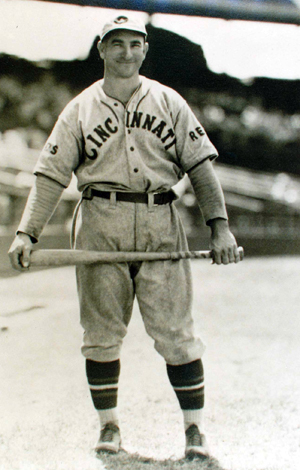 Born in Hillsboro in 1901, Wes Schulmerich was a multi-talented athlete credited with being the first player from Oregon State University to reach the Major Leagues, where he played for four seasons. In later years, he became one of the school's most visible fans, and was inducted into the Oregon Sports Hall of Fame's inaugural class in 1980.
Born in Hillsboro in 1901, Wes Schulmerich was a multi-talented athlete credited with being the first player from Oregon State University to reach the Major Leagues, where he played for four seasons. In later years, he became one of the school's most visible fans, and was inducted into the Oregon Sports Hall of Fame's inaugural class in 1980.Schulmerich, a 5-foot-11, 210-pound athlete, reached Oregon Agricultural College (OSU) at age 22, having turned down an offer to play football at Notre Dame. In Corvallis, he played football, baseball and ran for the track team.
Schulmerich played fullback, linebacker and even handled the place-kicking duties in football, which caught the attention of several teams in the National Football League. He was an all-conference player in the Pacific Coast Conference as a junior and senior, but he focused on baseball following his graduation in 1927.
Having hit .459 as a senior, Schulmerich earned a spot with the Los Angeles Angels of the Pacific Coast League in 1927, and spent four seasons with the club. After hitting .380 with 28 homers in 189 games during the 1930 season, the Boston Braves traded for him and he moved into the starting line-up the next season. The Braves traded him to the Philadelphia Phillies in 1933, where he hit .334 in 95 games. The Phillies traded him to Cincinnati early in the 1934 season, and they released him following their last-place finish in the National League.
In 429 games in the National League, he finished with a .263 average, 192 RBIs and 27 home runs.
Following his days in the Majors, Schulmerich bounced around with numerous minor league teams, serving as player/manager for several, before retiring in 1939 at age 41.
He and his wife Cecile were regulars for decades at OSU football, basketball and baseball games. He died in 1985.
Schulmerich was inducted to the Oregon State Sports Hall of Fame in 1980.
- Ken Williams - Baseball
-
1980
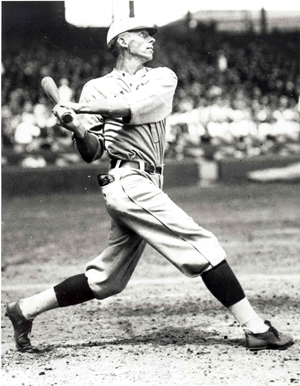 Born in Grants Pass in 1890, Ken Williams was one of the state’s first Major Leaguers, spending 14 seasons with the Cincinnati Reds, St. Louis Browns and Boston Red Sox as a top-flight hitter and base stealer.
Born in Grants Pass in 1890, Ken Williams was one of the state’s first Major Leaguers, spending 14 seasons with the Cincinnati Reds, St. Louis Browns and Boston Red Sox as a top-flight hitter and base stealer.Williams didn’t find his way to professional baseball until 1913, when he was already 23. After two successful seasons in the minors, he earned time with the Cincinnati Reds in 1915 and ’16, but didn’t become a Major League regular until 1919 with the Browns at age 29.
In the following 11 years, Williams hit .300 or better 10 times, stole 149 bases and 196 home runs. In ’22, he led the American League with 39 homers and drove in 155 runs as the Browns finished second, just a game behind the New York Yankees. He also stole 37 bases, becoming the first player to hit 30 home runs and steal 30 bases.
In 1929, the Red Sox released him and he closed his career with two seasons in Portland, retiring in 1931 at age 41.
In all or part of 14 seasons in the Majors, Williams had 1,552 hits, hit 196 homers, drove in 913 runs, stole 154 bases and finished with a .319 average. In four seasons with the Beavers, Williams hit .321 with 71 homers.
Williams ran a restaurant in Grants Pass before passing away in 1959. He was inducted to the Oregon Sports Hall of Fame as part of the inaugural class in 1980.
1981
- Howard Fox - Baseball
-
1981
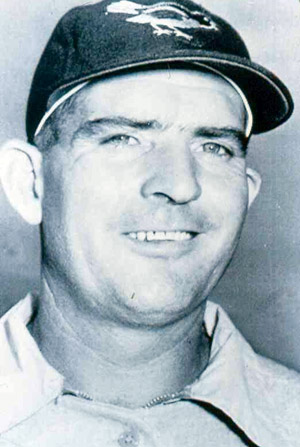 Born in Coburg, Howard Fox played his way through the University of Oregon and into a lengthy Major League career as a right-handed pitcher. He spent nine seasons and played for three different teams from 1944 to ’54 before moving to the minor leagues, where his career ended tragically at the age of 34.
Born in Coburg, Howard Fox played his way through the University of Oregon and into a lengthy Major League career as a right-handed pitcher. He spent nine seasons and played for three different teams from 1944 to ’54 before moving to the minor leagues, where his career ended tragically at the age of 34.Fox attended Oregon on a basketball scholarship after a standout career at Springfield’s Thurston High, whose teams were known as the Pansies in those days. Thurston played into the 1938 state tournament under coach Genevieve Beaman.
Fox attended Oregon for only a short time and did not earn a letter in any sport. The Cincinnati Reds signed him in 1943 and he reached the Major Leagues as a reliever in two games the following year at age 23. He played for the Reds through 1951 before being traded to the Philadelphia Phillies, who released him after a 2-7 season as a starter. He appeared in 38 games as a reliever for the Baltimore Orioles in 1954, but was released at age 33.
In 248 Major League games he went 43-72 with six saves and a 4.33 ERA. He led the National League in losses with 19 in 1949. In his best season, Fox went 11-8 as the No. 4 starter for the Reds in 1950, finishing with a 4.33 ERA. The Reds finished sixth in the league that season and last in attendance with an average of 7,000 fans per game.
As a minor league pitcher, he compiled a record of 74-55, including 19-9 with a 2.68 ERA in 1947 for the Reds’ Triple-A farm club in Syracuse, N.Y. In his final season, he went 3-8 in San Antonio of the Texas League. He also pitched for teams in Venezuela during the winter in 1953, ‘54 and ‘55.
Shortly after the 1955 season, he was stabbed to death while bouncing three young men from the tavern he owned near San Antonio.
He was inducted into the Oregon Sports Hall of Fame in 1981.
- Sylvester Johnson - Baseball
-
1981
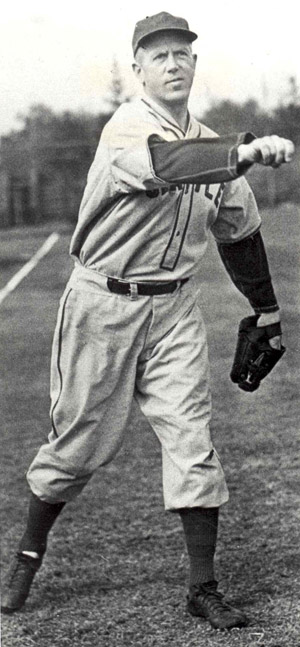 Born in Portland on Dec. 31, 1900, Sylvester "Syl" Johnson played his way into the professional ranks as a right-handed pitcher at age 19 and didn't stop until age 46, a span that included 19 seasons in the Major Leagues.
Born in Portland on Dec. 31, 1900, Sylvester "Syl" Johnson played his way into the professional ranks as a right-handed pitcher at age 19 and didn't stop until age 46, a span that included 19 seasons in the Major Leagues.Johnson started his pro career with the Vancouver, B.C. Beavers of the Pacific Coast International League, but transferred to the Portland Beavers late in the 1920 season. In 1921, he went 12-26 with a 3.82 ERA over 304 innings, and the Detroit Tigers traded five players and $30,000 for his contract and that of Herman Pillette, a St. Paul, Ore., native who played three seasons with the team.
Johnson played 1921 as a spot starter and went 7-3 with a 3.71 ERA. He played that role until 1929 when the St. Louis Cardinals, who traded for him in 1926, put him into their rotation and he finished 13-7. He went 12-10 in 1930 and 11-9 in '31, helping the Cardinals to the World Series title that season.
The Cardinals traded him to the Philadelphia Phillies in 1934 and he played seven seasons for them.
After being released by the Phillies, Johnson played five seasons with the Seattle Rainiers of the PCL and appeared in one game for the Vancouver, B.C., Capilanos of the Western International League. He retired in 1946.
In his Major League career, Johnson finished 112-117 with a 4.06 ERA in 542 appearances. He made 209 starts.
Johnson died in 1985. He was inducted into the Oregon Sports Hall of Fame in 1981.
- Roy Helser - Baseball
-
1981
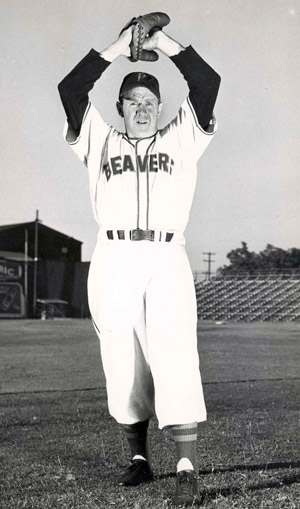 Roy Helser made a name for himself as a long-time pitcher for the Portland Beavers, then as a coach at Linfield College, where he led the Wildcats to a national championship.
Roy Helser made a name for himself as a long-time pitcher for the Portland Beavers, then as a coach at Linfield College, where he led the Wildcats to a national championship.Helser graduated from Portland’s Benson High, but didn’t play baseball at the school, and didn’t begin attending Linfield until age 21. After a three-sport career in which he won 11 letters at Linfield, he moved into the pro baseball ranks with Peoria, Ill., and Waterloo, Iowa in the summer of 1937. He didn’t, though, latch on fully with the game until age 28 with the Salem Senators in 1940. He retired in 1952 at age 40.
Helser found his way to the Beavers in 1942 and played at the Vaughn Street ballpark for 11 seasons, including 1945 when the team won the Pacific Coast League title. Helser won 122 games in those 11 years, earning 20 wins in 1944, ’45 and ’46. His age played a factor in keeping him out of the Major Leagues. He finished his minor league career with 159 wins, 125 losses and a 3.53 ERA. During Helser’s career with the Beavers, the team regularly played 180 games or more during a season.
Helser played and coached in semi-pro leagues, which led him to become Linfield’s baseball coach in 1950. The Wildcats went 10-8 in his first season and won the Northwest Conference title. Helser used the off days between starts to coach the team and also coached the Linfield basketball team in winter. After retiring from the Beavers in ’52, he devoted his time to the college on a full-time basis.
In his 21 years as baseball coach, Helser led the Wildcats to 14 league titles. In 1966, Linfield went 26-9 and won the NAIA national championship, outscoring its four opponents in the national tournament 50-12.
In 12 years as basketball coach, including the first three as a co-coach with football coach Paul Durham, his teams won conference titles five times and played in the NAIA tournament twice.
After stepping down as baseball coach following the 1970 season, Helser served as athletic director for five years. The Wildcats won the NAIA baseball title in 1971 under first-year coach At Rutschman.
Helser died in 1994 at age 83. The baseball field at Linfield is named after him. He was inducted to the Oregon Sports Hall of Fame in 1981.
1982
- Bill Beard - Baseball
-
1982
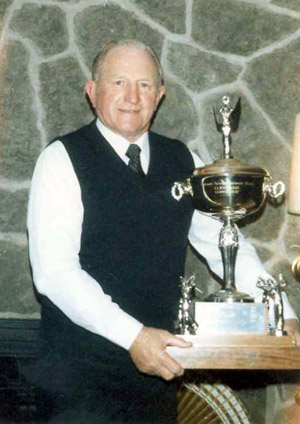 Bill Beard grew up in Oregon City, but made most of his sporting impact on the Salem area as an athlete and businessman.
Bill Beard grew up in Oregon City, but made most of his sporting impact on the Salem area as an athlete and businessman.Beard played football, basketball and baseball at Willamette University of the Northwest Conference and was selected all-conference in football twice and baseball three times from 1935 to ‘37. He played professionally as a catcher for 10 seasons - before and after World War II, in the minor leagues, all on teams in the Northwest. He progressed enough to reach the Pacific Coast League and played 187 games for the Portland Beavers and Seattle Rainiers before settling down with the Salem Senators of the Western International League from 1949-51. He served as a player/manager for the Senators for one game in 1949. He retired in 1951 at age 36.
He played semi-professionally for the Drain Black Sox in the ‘50s, and opened Bill Beard Sporting Goods in 1960.
Beard was a long-time fundraiser for Willamette University’s athletic program and also officiated football and basketball games at the youth level in the Salem area. As a senior golfer, he won state championships 1977 and 1980.
He was inducted into the Oregon Sports Hall of Fame in 1982 and the Willamette University Hall of Fame in 1991.
- Ad Liska - Baseball
-
1982
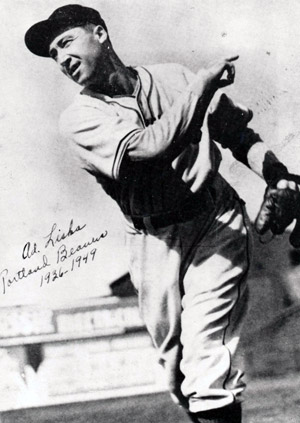 Born and bred in Nebraska, Ad Liska fished in the Major Leagues for all or parts of five seasons before settling in Portland for 14 seasons with the Beavers, earning a spot in the hearts of Oregonians and the Pacific Coast League in that time.
Born and bred in Nebraska, Ad Liska fished in the Major Leagues for all or parts of five seasons before settling in Portland for 14 seasons with the Beavers, earning a spot in the hearts of Oregonians and the Pacific Coast League in that time.Following his graduation from Dwight, Neb., High in 1925, Liska spent a short time teaching elementary school, and pitched briefly for the University of Nebraska before he found his way to the Lincoln, Neb., Links of the Western League in 1926 at age 19. Two seasons later, he went 20-4 for the Minneapolis Millers of the American Association, which caught the attention of the Washington Senators.
Liska played full seasons with the Senators in 1929 and ’30 and with the Philadelphia Phillies in 1933. In ’33 he went 3-1 and led the National League in games finished with 25, although they were for a team that won just 60 games and finished last in attendance with an average of just over 2,000 fans per game. His one win of the season came on the last of his 25 relief appearances. He also played part of the 1931 season with the Senators and the ‘32 season with the Phillies.
In his five seasons in the Majors, Liska compiled a record of 17 wins, 18 losses and three saves with a 3.87 ERA in 111 appearances. He started 28 games.
After two seasons in the minors back East and in the Midwest, Liska settled in with the Beavers and the PCL in 1936 at age 29 as a right-handed, submarine-style pitcher. He didn’t retire until 1949 at age 42.
As a regular starter at Vaughn Street Ballpark, Liska won 15 or more games nine times. He won 20 or more games three times, including 24 in 1937. In 1936, he went 15-12 as the Beavers finished atop the league standings and won the PCL championship series over the Oakland Oaks. In 1945, he went 20-12 with a 2.34 ERA as the Beavers finished atop the regular season standings at 112-68.
In his 14 seasons with the Beavers, Liska finished 198-194 and ended all but one season with an ERA under 4.00.
In 1950, he managed the Salem Senators to a 57-92 record then began a long career in the postal service. He died in Portland in 1998.
Liska was voted into the Oregon Sports Hall of Fame in 1982 and elected to the PCL Hall of Fame in 2003.
- Dick Whitman - Baseball
-
1982
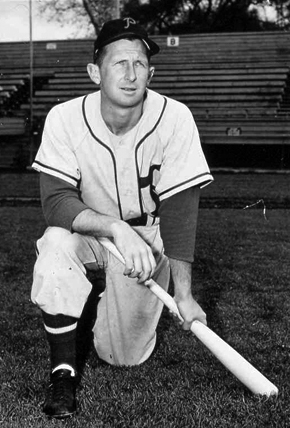 Dick Whitman earned a spot in Oregon’s sports legacy by reaching the Major Leagues for all or parts of six seasons, and helped two teams win the National League pennant. Born in Woodburn in 1920, Whitman played outfield from 1940-42 at the University of Oregon, and signed with the Brooklyn Dodgers after the 1942 college season. He hit a combined .313 for two minor league teams that summer, then entered military service where he saw action at the Battle of the Bulge.
Dick Whitman earned a spot in Oregon’s sports legacy by reaching the Major Leagues for all or parts of six seasons, and helped two teams win the National League pennant. Born in Woodburn in 1920, Whitman played outfield from 1940-42 at the University of Oregon, and signed with the Brooklyn Dodgers after the 1942 college season. He hit a combined .313 for two minor league teams that summer, then entered military service where he saw action at the Battle of the Bulge.Whitman, at age 26, went immediately to the Dodgers following the war and hit .260. The team sent him to its Triple-A team in Montreal in 1947, where he hit .327 with 62 RBIs and helped the Royals to the International League championship. In ’48, the Dodgers brought him back in mid-season and he remained in the Majors until 1951. In Brooklyn, Whitman was a reserve outfielder and pinch hitter. He played for the 1949 National League champion team. The Dodgers traded him to Philadelphia that winter and he helped the Phillies “Whiz Kids” win the NL title in 1950.
In his six seasons in the big leagues, he had 165 hits, drove in 67 runs, hit two homers and finished with a .259 average.
After moving back to the minors, he played for four different teams, including the Portland Beavers in 1955. He hit .304 that season.
In 1956 and ’57, he served as player/manager of the San Jose, Calif., JoSox of the Class C California League. He retired after the 1957 season at age 36.
In 10 seasons of minor league action, Whitman had 1,207 hits, hit 64 homers and averaged a combined .321 in 1,093 games.
Upon retiring, Whitman moved into the position of maintenance manager for the San Jose, Calif., Water Company and remained in that post for 29 years. He died in 2003 at age 82.
Whitman was inducted to the Oregon Sports Hall of Fame in 1982.
1983
- Bobby Doerr - Baseball
-
1983
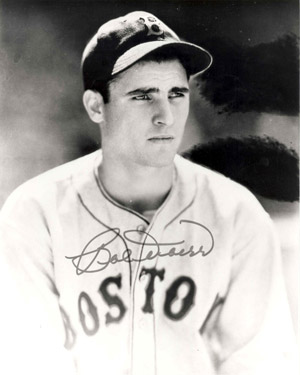 Bobby Doerr played 14 seasons for the Boston Red Sox and is viewed as one of the all-time greats at second base, having been named an All-Star nine times and earning votes as the American League MVP seven times.
Bobby Doerr played 14 seasons for the Boston Red Sox and is viewed as one of the all-time greats at second base, having been named an All-Star nine times and earning votes as the American League MVP seven times.A resident of Oregon, mainly Junction City, since the late ‘30s, Doerr played in the Major Leagues from 1937 to 1951, missing only the ’45 season due to military service. In his career with the Red Sox, he collected 2,042 hits in 1,865 games and finished with 223 home runs, 1,247 RBIs and a .288 average. He played most of his career as a teammate of Ted Williams.
In 1950, Doerr hit .309, with career bests of 172 hits, 27 home runs and 120 RBIs, while earning a salary of $30,000. His 11 triples led the American League. He played in one World Series – 1946, which the Sox lost to the St. Louis Cardinals in six games.
In three minor league seasons with the Hollywood Stars of the Pacific Coast League – beginning in 1934 at age 16, he batted .321 and collected 495 hits in 414 games. The Red Sox purchased his rights from Hollywood for $75,000 in 1935.
Doerr worked as a scout, hitting coach or first base coach for the Red Sox and Toronto Blue Jays from 1957 through ’81. The Red Sox retired his number – 1, in 1988.
Junction City has hosted the Bobby Doerr Baseball Classic in June for teams under 14 since 2008.
Doerr was inducted into the Oregon Sports Hall of Fame in 1983, and voted into the Baseball Hall of Fame by the Veterans Committee in 1986.
1984
- Mickey Lolich - Baseball
-
1984
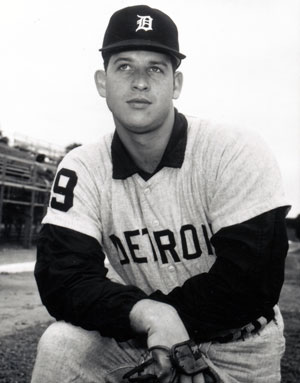 Born in Portland in 1940, Mickey Lolich played his way nearly to the Hall of Fame mostly with the Detroit Tigers, including an MVP performance in the 1968 World Series.
Born in Portland in 1940, Mickey Lolich played his way nearly to the Hall of Fame mostly with the Detroit Tigers, including an MVP performance in the 1968 World Series.Lolich grew up in Portland and signed with the Detroit Tigers as a left-handed pitcher in the summer of 1958 after graduating from Lincoln High. He spent five seasons in the minors, including three with the Durham, N.C., Bulls, and most of 1962 with the Portland Beavers. The Tigers called him up in May of 1963 and he spent 16 seasons in the big leagues.
After a solid season as a reliever and spot starter in ’63, Lolich moved into Detroit’s starting rotation and started at least 30 games for 13 straight seasons, including 1976 with the New York Mets. In 489 starts during that stretch, he pitched 195 complete games, 41 of which were shutouts.
In 1968, Lolich went 17-9 with a 3.19 ERA, then pitched three complete game wins in the World Series against St. Louis. He won Game 2, Game 5 and Game 7, pitching the decisive game on just two days rest.
Lolich was named to three All-Star teams and finished second in Cy Young voting in 1971 after compiling a 25-14 record and a league-best 308 strikeouts, and third in ’72 following a 22-14 season with a 2.50 ERA that helped the Tigers win the AL East.
After taking the ’77 season off, he finished his career as a reliever with the San Diego Padres in 1978-79. He retired following the ’79 season at age 38.
In his 16 seasons, Lolich went 217-191 and compiled a .344 ERA with 2,832 strikeouts. He retired with 2,679 strikeouts while with the Tigers, a total that left him as the AL’s All-Time leader for strikeouts by a left-hander.
He was inducted into the Oregon Sports Hall of Fame in 1984.
1985
- Pete Ward - Baseball
-
1985
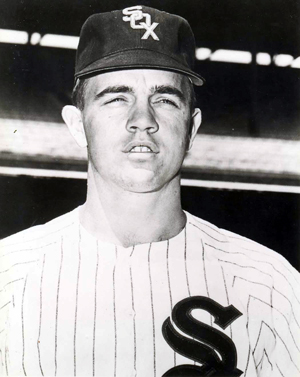 Pete Ward earned his way into Oregon sports lore as a player in the Major Leagues for nine seasons, mostly with the Chicago White Sox, then ran the Pete Ward baseball clinic in Oregon for many years.
Pete Ward earned his way into Oregon sports lore as a player in the Major Leagues for nine seasons, mostly with the Chicago White Sox, then ran the Pete Ward baseball clinic in Oregon for many years.Born in Canada in 1937, Ward graduated from Portland's Jefferson High and played baseball for Lewis and Clark College before signing with the Baltimore Orioles in 1958 at age 20. He spent five years in the minors, the final one in Rochester of the International League, where he hit .328 with 22 homers and 90 RBIs and was called up to the big leagues late in the year.
Baltimore traded him to the Chicago White Sox prior to the 1963 season and he spent seven years with the club. In 1963, he hit .295 with 22 home runs, 84 RBIs, seven stolen bases and was named Rookie of the Year by The Sporting News, although he finished second in the official balloting.
In '64, he hit .282 with 94 RBIs and 23 homers, helping him develop a reputation as one of the American League's premiere power hitters. Sports Illustrated had him set to appear on the cover of its June 7 issue in 1965, but bumped him in favor of coverage of Muhammad Ali's fight with Sonny Liston. Ward didn't finish with a batting average higher than .247 for the remainder of his career, due in part to an off-field injury in 1965. In nine seasons as an outfielder, third or first baseman, he had 776 hits, 427 RBIs, 98 home runs and a collective .254 batting average.
He worked as a coach with the Atlanta Braves and in the Yankees' farm system in the '70s.
In 1971, Ward began the Pete Ward Baseball Clinic, which brought active and former Major League players, including Mickey Mantle, to the state as guest speakers. Ward was inducted into the Oregon Sports Hall of Fame in 1985.
1987
- Eddie Basinksi - Baseball
-
1987
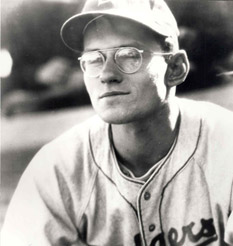 Eddie Basinski will forever be one of the most beloved players for fans of the Portland Beavers, having spent all or parts of 11 seasons primarily as a second baseman with the club beginning in 1947.
Eddie Basinski will forever be one of the most beloved players for fans of the Portland Beavers, having spent all or parts of 11 seasons primarily as a second baseman with the club beginning in 1947.In 1950, Basinski played in all 202 of the Beavers’ games and hit .240 in 822 plate appearances. He played in more than 150 games for seven seasons and finished having appeared in 1,455 games at either Vaughn Street Stadium or Multnomah Stadium before being traded to Seattle in 1957.
In 15 total seasons in the minors, including stops in Montreal, St. Paul, Minn., Newark, N.J., Seattle and Vancouver, B.C., he collected 1,747 hits, 116 homers, 702 RBIs and had a .258 average.
Basinski played parts of three seasons in the Major Leagues with the Brooklyn Dodgers and Pittsburgh Pirates, compiling 147 hits, four home runs, 59 RBIs and a .244 average in 203 games. His career in Portland was interrupted only by a short stint with the Pirates in 1947. He broke into the majors in 1944 at age 21 having never played in high school or college and with just 68 games in the minor leagues under his belt.
Basinski was also an accomplished violin player, having once performed with the Buffalo Philharmonic Orchestra, which earned him the nickname “Fiddler.”
He was inducted to the Oregon Sports Hall of Fame in 1987, and into the Pacific Coast League Hall of Fame in 2006.
- Rick Wise - Baseball
-
1987
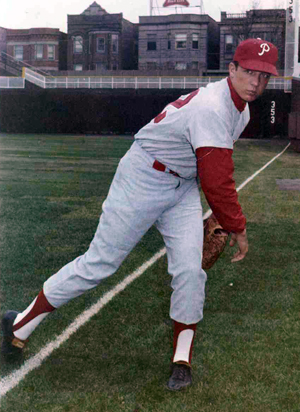 Rick Wise made a significant impact on the baseball world starting in Little League and continued into the Major Leagues for 18 seasons.
Rick Wise made a significant impact on the baseball world starting in Little League and continued into the Major Leagues for 18 seasons.Born in 1945, Wise grew up in Northeast Portland and led Rose City Little League to the Little League World Series as a 12-year-old in 1958. He led Madison High to the 1963 state title as a shortstop and right-handed pitcher, then signed with the Philadelphia Phillies. Assigned to Bakersfield of the California League Wise went 6-3 with a 2.63 ERA that summer. The Phillies called him up for the ’64 season, but send him back to the minors in ’65 and part of ’66. He returned to Philly in ’66 at age 20 and played the next 16 seasons in the Majors before retiring shortly after the 1982 season began.
In addition to Philadelphia, Wise played for the St. Louis Cardinals, Boston Red Sox, Cleveland Indians and San Diego Padres. He was an All-Star in ’71 with the Phillies and ’73 with the Cardinals.
In 1971, Wise threw a no-hitter against Cincinnati and also hit two home runs in the game. In Boston, he won Game 6 of the 1975 World Series as a reliever.
In 18 seasons, Wise won 11 or more games 10 times and finished 188-181 with a 3.69 ERA. He pitched 138 complete games and had 30 shutouts in 455 career starts. As a batter, he hit 15 home runs and drove in 66.
Following his playing career, Wise turned into a minor league coach for the next two decades. Wise was inducted to the Oregon Sports Hall of Fame in 1987.
1988
- Wade Williams - Baseball
-
1988
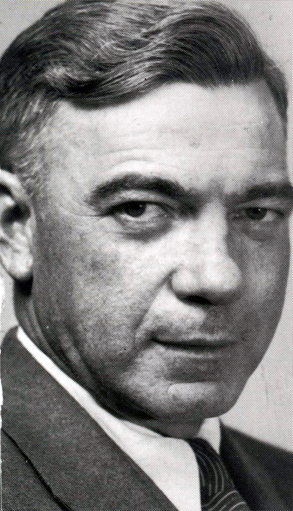 Williams made an impact as a long-time baseball coach at Lincoln High and at the American Legion level, mentoring numerous players to pro careers – most notably Johnny Pesky. That was after a memorable career as a football coach.
Williams made an impact as a long-time baseball coach at Lincoln High and at the American Legion level, mentoring numerous players to pro careers – most notably Johnny Pesky. That was after a memorable career as a football coach.Williams played collegiate football at the University of Iowa, then moved to Miami, Fla., in 1912. After contracting malaria, doctors urged him to move to a high, dry climate.
Williams began his journey into coaching as football coach at Baker High School in 1913. After military service, he moved to Portland to become a municipal bond investor, but returned to coaching football at Commerce High in 1921. Despite coaching teams from a school of 200 students, his players competed equally with schools of 1,000 students. He also coached baseball at Commerce.
Williams became the football coach at Lincoln in 1930 and made headlines by having the city install lights at Multnomah Stadium, making Lincoln the first school West of the Mississippi River to play a night game.
He began in Legion ball in 1932. Ten years later, he was forced to give up coaching Lincoln’s baseball team due to regulations that called for coaches to have majored in physical education in college. Williams taught history at the school.
The state baseball community saluted him in 1952 for his service in the American Legion ranks.
Williams was inducted to the Oregon Sports Hall of Fame in 1988.
1989
- Artie Wilson - Baseball
-
1989
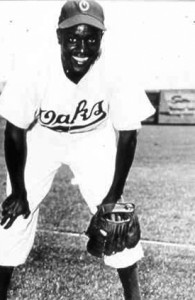 Artie Wilson reached his sporting fame as one of the top hitters in the Negro Leagues in the 1940s, but reached his fame in Oregon mostly off the field as an employee for 30 years at Gary Worth Lincoln Mercury in Portland.
Artie Wilson reached his sporting fame as one of the top hitters in the Negro Leagues in the 1940s, but reached his fame in Oregon mostly off the field as an employee for 30 years at Gary Worth Lincoln Mercury in Portland.
Born in Alabama in 1920, Wilson played his way into the Negro Leagues with the Birmingham Black Barons in 1942 and reached the All-Star Game four times. He helped the Barons reach the Negro League World Series three times. In 1948, Wilson hit .402 for the Barons, the last time a Major Leaguer batted above .400.
After winning the Pacific Coast League batting title with Oakland in 1950, Wilson reached the Major Leagues with the New York Giants in 1951 at age 30. In 19 games with the Giants, Wilson had four hits in 22 at-bats, drove in two runs and stole two bases. He spent the next six seasons mostly in the PCL, including the 1955 season in Portland.
He won three more batting titles in the PCL, playing 155 games or more from 1952-56. He skipped the 1958-61 season, but returned for 39 games in 1962, including his final 25 games with the Beavers. He retired at age 41.
He managed parts of the ’56 and ‘56 seasons in the Arizona-Mexicali Winter League. In 10 seasons in the minors, Wilson played in 1,331 games, had 1,609 hits and finished with a .312 average.
Wilson was inducted to the Oregon Sports Hall of Fame in 1988, and the PCL Hall of Fame in 2003. He died in 2010.
1990
- Walter McCredie - Baseball
-
1990
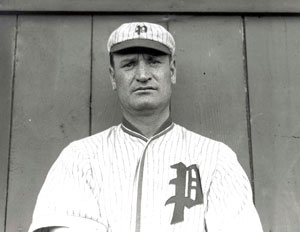 In the early days of baseball in the Rose City, Walter McCredie helped establish the Portland Beavers as an institution at Vaughn Street Park as player, manager and co-owner for two decades beginning in 1904.
In the early days of baseball in the Rose City, Walter McCredie helped establish the Portland Beavers as an institution at Vaughn Street Park as player, manager and co-owner for two decades beginning in 1904.Born in Manchester, Iowa, in 1876, McCredie found his way into professional baseball around age 20, and eventually moved up to the National League for part of the 1903 season with Brooklyn. In 56 games, McCredie hit .324 with 20 RBIs and 10 stolen bases, but the team traded him and future Hall of Famer Hughie Jennings (nearing the close of his career) to Baltimore of the Eastern League in midseason.
In 1904, McCredie moved to Portland, where the local team, the Browns, rarely won and were a financial mess. After batting .335 in ’04, McCredie and his uncle William McCredie, a lawyer in Vancouver, Wash., bought the team and Walter McCredie began a stretch of five seasons as the starting right fielder and manager in 1905. In 1906, the McCredies changed the team nickname to Beavers and, just two seasons after losing 136 games, the team went 115-60 and won the Pacific Coast League title.
Walter McCredie hit over .300 three times made no fewer than 466 plate appearances as a player or player/manager in his first six years in Portland. In 1910, he began concentrating on managing and guided the team to PCL titles four more times: 1910, ’11, ’13 and ’14, helped in part by a relationship with Cleveland of the American League.
The McCredies owned the Beavers into 1921, when they sold the team after a string of losing seasons led to financial woes.
Walter McCredie spent several more seasons managing various teams in the Northwest and also worked as a scout for the Detroit Tigers before passing away in 1934 at age 57.
In all or parts of 18 seasons in the minor leagues, he batted .282 with 1,516 hits.
He is credited with having managed teams in 20 seasons, including 17 with the Beavers.
Walter McCredie was inducted into the Oregon Sports Hall of Fame in 1990 and into the PCL Hall of Fame in 2003.
1992
- John Frederick - Baseball
-
1992
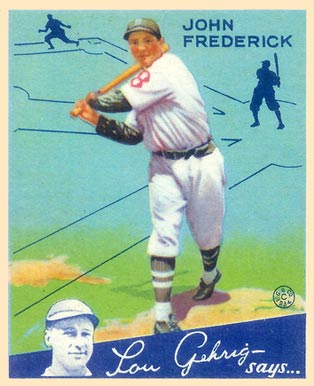 John Frederick played for the Brooklyn Dodgers of the National League for six seasons before making his connection to the state of Oregon with the Portland Beavers.
John Frederick played for the Brooklyn Dodgers of the National League for six seasons before making his connection to the state of Oregon with the Portland Beavers.Frederick, born in Colorado, began his professional baseball career in 1921 at age 19, playing in Canada. He entered the PCL two seasons later with Salt Lake City, and played three seasons there, followed by two seasons with Hollywood and then a season with Memphis of the South Atlantic League, terrorizing pitchers for no fewer than 185 hits and a .277 average during those years.
In 1929, Frederick, at age 27, set a Major League record for rookies with 82 extra base hits. His 52 doubles led the Majors that season. In his six seasons with Brooklyn, he collected 954 hits, 85 home runs, 377 RBIs and a combined batting average of .308 in 805 games. Following the 1934 season, the Dodgers traded him to Sacramento of the Pacific Coast League, where he played just one season.
Frederick became a Portland Beaver in 1936 and played 808 games over five seasons. He batted better than .301 in each of those seasons, and served as player/manager of the team in 1940. Following the 1940 season, Frederick retired and lived the remainder of his life in Tigard, where his family owned picnic-oriented Avalon Park for three decades. Johnny Frederick, his son, played at Oregon State in the 1950s.
John Frederick died in Tigard in 1977. He was inducted into the Oregon Sports Hall of Fame in1992 and into the Pacific Coast League Hall of Fame in 2005.
1994
- Dave Roberts - Baseball
-
1994
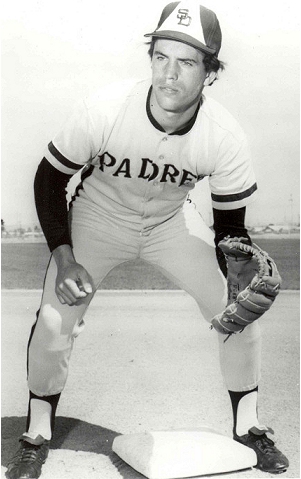 A native son of Oregon, and a graduate of Corvallis High School, Dave Roberts made a spectacular leap into professional sports as baseball’s No.1 draft choice in 1972 – the only time an Oregonian has ever earned that honor. Drafted by the San Diego Padres, Roberts went on to play 11 years in the major leagues with career statistics of 49 HRs, 208 RBI’s and a .239 batting average.
A native son of Oregon, and a graduate of Corvallis High School, Dave Roberts made a spectacular leap into professional sports as baseball’s No.1 draft choice in 1972 – the only time an Oregonian has ever earned that honor. Drafted by the San Diego Padres, Roberts went on to play 11 years in the major leagues with career statistics of 49 HRs, 208 RBI’s and a .239 batting average. He first gained national attention at the University of Oregon when as a sophomore, he hit .384 against PAC-8 pitchers and was selected as the All-Conference shortstop. 1972 was a thrilling year for Roberts as he was named NCAA All-American and NCAA Player of the Year, led the nation in home runs as well as being the first Oregon player since 1958 to top the coveted .400 mark. Roberts’ love of baseball has never gone away and he is currently a major league scout for the Detroit Tigers.
- Jack Wilson - Baseball
-
1994
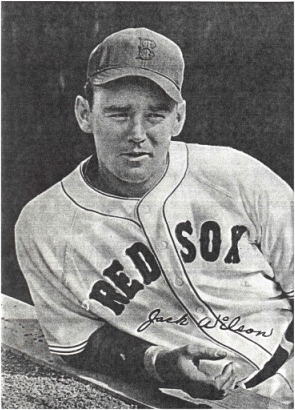 Jack played for the Portland Beavers from 1932-34 before going onto an outstanding major league career with the Boston Red Sox as a starting pitcher. While playing for Boston (1935-41), he posted a 16-10 record in 1940. He was also the American League strikeout leader in 1937 with 137. Wilson was traded to the Washington Senators in 1941 and ended his excellent career in 1942 with the Detroit Tigers. His major league career totals include 281 games, a .496 win/loss ration and a 4.51 ERA. He played for Columbia Prep and coached the University of Portland Pilots.
Jack played for the Portland Beavers from 1932-34 before going onto an outstanding major league career with the Boston Red Sox as a starting pitcher. While playing for Boston (1935-41), he posted a 16-10 record in 1940. He was also the American League strikeout leader in 1937 with 137. Wilson was traded to the Washington Senators in 1941 and ended his excellent career in 1942 with the Detroit Tigers. His major league career totals include 281 games, a .496 win/loss ration and a 4.51 ERA. He played for Columbia Prep and coached the University of Portland Pilots.
1997
- Dale Murphy - Baseball
-
1997
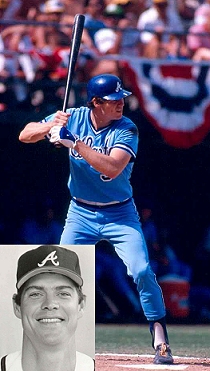 Portland native Dale Murphy was a standout for Wilson High School and was Atlanta’s first round draft pick, fifth overall in 1974. He played 15 seasons and set ten team career records with the Braves, who retired his uniform number (3). After eighteen years in baseball, Murphy finished with a career record of 398 home runs, 1266 RBI’s, 2111 hits and a .265 batting average.
Portland native Dale Murphy was a standout for Wilson High School and was Atlanta’s first round draft pick, fifth overall in 1974. He played 15 seasons and set ten team career records with the Braves, who retired his uniform number (3). After eighteen years in baseball, Murphy finished with a career record of 398 home runs, 1266 RBI’s, 2111 hits and a .265 batting average.Murphy was the youngest player ever voted National League MVP back-to-back in 1982 and 1983. He won five consecutive gold Glove Awards (1982-86), was named outfielder for The Sporting News National League All-Star and Silver Slugger teams for four straight years (1982-86), and played in seven major league All-Star games (1980, 1982-87). His charitable work earned him the Lou Gehrig Memorial Award in 1985 and the Roberto Clemente Award in 1988.
1998
- Harold Reynolds - Baseball
-
1998
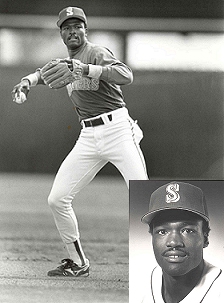 Corvallis native Harold Reynolds was both a football and baseball standout at Corvallis High School before becoming the number one draft pick by the Seattle Mariners in 1980. He played professional baseball for 14 seasons (1981-1994). Reynolds played 12 years in the major leagues including ten with the Mariners (1983-92) and single seasons with Baltimore (1993) and the California Angels (1994).
Corvallis native Harold Reynolds was both a football and baseball standout at Corvallis High School before becoming the number one draft pick by the Seattle Mariners in 1980. He played professional baseball for 14 seasons (1981-1994). Reynolds played 12 years in the major leagues including ten with the Mariners (1983-92) and single seasons with Baltimore (1993) and the California Angels (1994). The switch-hitting second baseman was a three-time American League Gold Glove Award winner while at Seattle. He led American League and second basemen in assists five times, total chances four times and put-outs three times. He also led the league in double plays in four different seasons. Reynolds, a two-time All-Star selection (1987-1988), finished his career with 1,374 games, 1,233 hits (230 doubles, 53 triples, 21 home runs), 640 runs scored, 343 RBI’s, 250 stolen bases, a .258 career average and .979 fielding percentage. Currently Reynolds is a studio analyst for ESPN’s Baseball Tonight.
2002
- Wally Backman - Baseball
-
2002
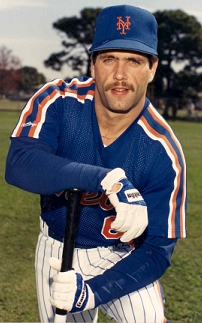 Wally Backman was an All-State baseball player at Aloha High School. He was a first round draft choice in the 1977 free agent draft, the 16th pick overall. He played 14 years in the major leagues starting with the New York Mets in 1980 and finishing up with the Seattle Mariners in 1993. Wally was the starting second baseman for the 1986 World Series Championship New York Mets. He hit for a .333 average in that exciting World Series in which the Mets beat the Boston Red Sox.
Wally Backman was an All-State baseball player at Aloha High School. He was a first round draft choice in the 1977 free agent draft, the 16th pick overall. He played 14 years in the major leagues starting with the New York Mets in 1980 and finishing up with the Seattle Mariners in 1993. Wally was the starting second baseman for the 1986 World Series Championship New York Mets. He hit for a .333 average in that exciting World Series in which the Mets beat the Boston Red Sox. In 1985, Wally's finest year, he let all national league second basemen in fielding with a .989 percentage. He played in 3 National League championship series, two with the Mets in 1986 and Pittsburgh in 1990. He established career marks of 1,102 games, 893 hits, 482 runs scored, 117 stolen bases and a .275 batting average.
2005
- Scott Brosius - Baseball
-
2005
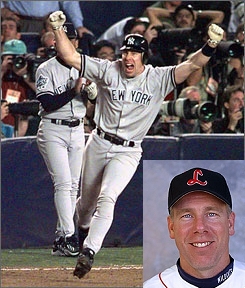 Scott was born in Hillsboro and his baseball career began at Rex Putnam High School. He then went on to play three seasons at Linfield College. He was selected by the Oakland Athletics in the 20th round in the 1987 MLB Draft. He made his Major League debut in 1991 in the outfield, a position he had not played since high school. Eventually he settled in at his now familiar third base position.
Scott was born in Hillsboro and his baseball career began at Rex Putnam High School. He then went on to play three seasons at Linfield College. He was selected by the Oakland Athletics in the 20th round in the 1987 MLB Draft. He made his Major League debut in 1991 in the outfield, a position he had not played since high school. Eventually he settled in at his now familiar third base position.In 1997, he was traded to the New York Yankees. Scott rose to the occasion, moving from a small market team to the storied Yankee franchise, by dramatically increasing his level of production. Scott was an American League All Star in 1998, a Gold Glove winner in 1999, and he was a member of three World Series Championship teams.
In 1998, he was named the World Series Most Valuable Player hitting for a.471 average and an .824 slugging percentage. One of his most dramatic hits was a game winning home run in Game 3. Scott is currently an assistant baseball coach for alma mater Linfield College.
2006
- Wayne Twitchell - Baseball
-
2006
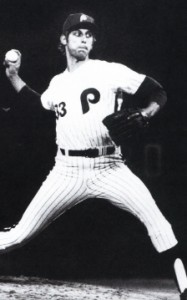 In 1966, Wayne Twitchell was selected by the Houston Astros as the 3rd player overall in the draft. That was the beginning of a prosperous career in the Major Leagues that spanned 10 years, spending the majority of his time with the Philadelphia Phillies. In September of 1970 he made his first MLB appearance, striking out the side against Minnesota. He faced Rod Carew, Tony Oliva and Harmon Killebrew in order. In 1973, he pitched five complete game shutouts, was twice named the National League Pitcher of the Week and appeared in the Major League All-Star game. He retired with a career ERA of 3.98.
In 1966, Wayne Twitchell was selected by the Houston Astros as the 3rd player overall in the draft. That was the beginning of a prosperous career in the Major Leagues that spanned 10 years, spending the majority of his time with the Philadelphia Phillies. In September of 1970 he made his first MLB appearance, striking out the side against Minnesota. He faced Rod Carew, Tony Oliva and Harmon Killebrew in order. In 1973, he pitched five complete game shutouts, was twice named the National League Pitcher of the Week and appeared in the Major League All-Star game. He retired with a career ERA of 3.98.After retiring, he returned to Portland and began a career as a commercial real estate broker. But baseball was still in his blood and he served his alma mater, Wilson High School, as a pitching coach, working with up-and-coming pitchers. In 1982, Wilson retired his jersey, #36. He also served several years as the Treasurer for the Active and Oldtimers Baseball Association.
He was an outstanding athlete in high school, earning nine varsity letters in 3 sports. In addition to his accomplishments on the baseball field, he also was selected 1st team all-city, PIL MVP, 2nd team all-state in football and was selected to play in the Shrine game. He was also named 2nd team all-city in Basketball.
Wayne was inducted into the PIL Hall of Fame in 1990 and received the Order of the Golden W from Wilson High School in 2001 for his year of service to the school.
2008
- George Freese - Baseball
-
2008
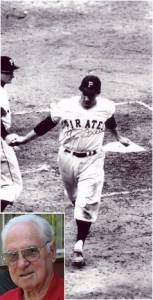 A star at third base for the Portland Beavers from 1957-60. Freese was all-Pacific Coast League in 1958 and 1959, hitting .305 and .319, respectively, both team highs. He also led the ‘58 Beavers in home runs, with 35.
A star at third base for the Portland Beavers from 1957-60. Freese was all-Pacific Coast League in 1958 and 1959, hitting .305 and .319, respectively, both team highs. He also led the ‘58 Beavers in home runs, with 35. George’s athletic career began in Wheeling West Virginia, where he lettered in football, basketball and track. From there, he went on to Pitt, where as a freshman in 1944, he was starting quarterback. He served in the Air Force until 1946, and when discharged, he received a scholarship to West Virginia University, where he lettered in 1946-1947 as an all star quarterback.
He was involved in professional baseball for 26 years, with the Brooklyn Dodgers, Detroit Tigers, Pittsburgh Pirates, Chicago Cubs, Hollywood Stars, LA Angels, and Portland Beavers. The 6-0, 190-pounder coached for the Chicago Cubs, scouted for years and worked as a minor-league manager.
Freese has been a Portland resident since 1958, and remains a member of the Oregon Old Timers Association.
2011
- Tom Trebelhorn - Baseball
-
2011
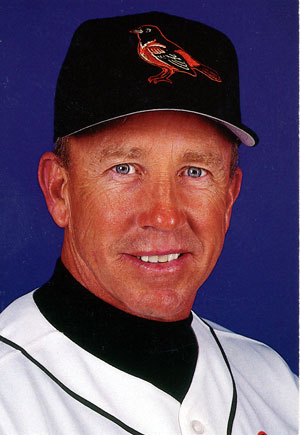 Tom Trebelhorn played his way from Southeast Portland into an entertaining career as manager in the Major Leagues, Minor Leagues and even the international game on his way to being inducted into the Hall of Fame.
Tom Trebelhorn played his way from Southeast Portland into an entertaining career as manager in the Major Leagues, Minor Leagues and even the international game on his way to being inducted into the Hall of Fame.Born in 1948, Trebelhorn graduated from Portland’s Cleveland High and played catcher at Portland State. In 1970, the Northwest League’s Bend franchise, affiliated with the California Angels at the time, drafted him and played him parts of five seasons at Class A and AA before becoming a coach. In 1975, the Oakland A’s made him manager of the Boise A’s, who also played in the Northwest League. In Trebelhorn’s second season, 17-year-old Rickey Henderson joined the team and refined his technique for stealing bases, which eventually helped him reach the Baseball Hall of Fame.
Trebelhorn reached the Major Leagues as first base coach for the Milwaukee Brewers in 1984, then managed the club’s Triple-A affiliate, the Vancouver Canadians, to the Pacific Coast League title in 1985. On his return to the Brewers in ’86, he became interim manager for the final nine games upon the retirement of George Bamberger.
Trebelhorn managed the Brewers for five seasons and led the team to a 422-397 overall record, including 91-71 in his first season, prompting Baseball America to name him Manager of the Year.
Trebelhorn managed the Chicago Cubs for the strike-shortened 1994 season, but compiled only a 49-64 record. He latched on with the Baltimore Orioles in ’96 and stayed with the club for 12 years, including several as Director of Player Development.
In 2008, he became manager of the Salem-Keizer Volcanoes of the Northwest League, and served as third base coach for the Italian National Team in the World Baseball Classic during the offseason in 2009.
Trebelhorn was inducted to the Oregon Sports Hall of Fame in 2011.